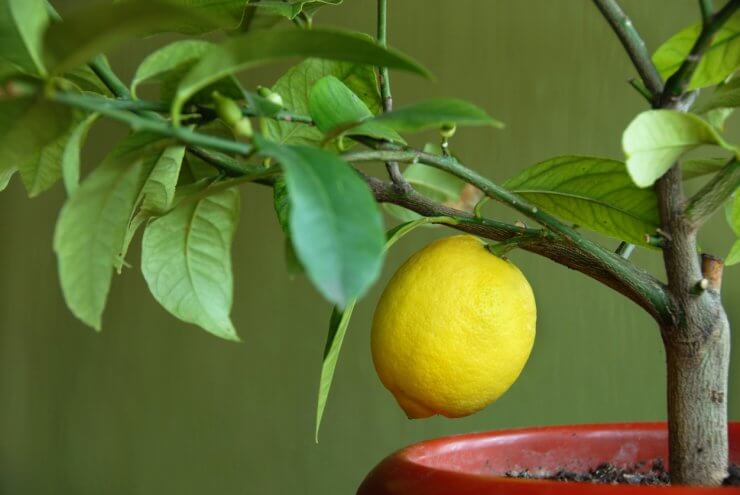
Lemon tree growing in container
Lemon trees can flourish in containers. There are dwarf varieties that have been developed to make having an indoor tree more manageable. And with a little prudent pruning, you can have a beautiful, productive tree for years. And depending on where you live, your tree can spend much of its time outside, as long as it’s frost-free and it gets everything else it needs.
The secret to successfully growing lemon trees in containers is to have good light, a comfortable temperature and humidity for the tree, healthy soil, and consistent water. Hit all those targets and your container-grown lemon tree will be just fine!
Lemon tree in full sunlight
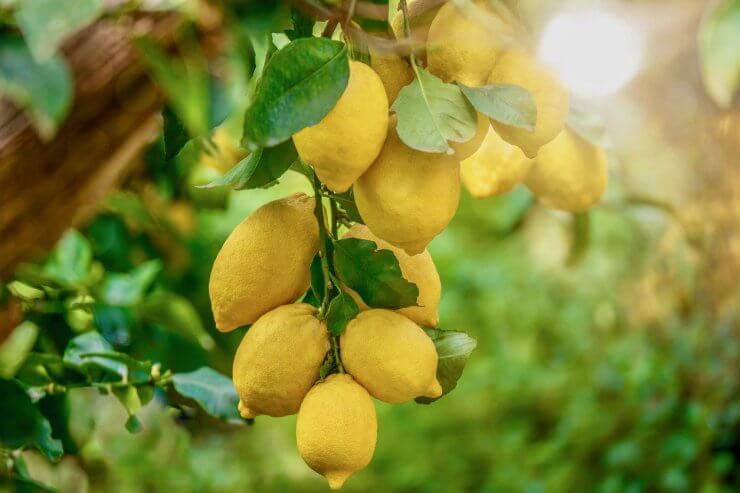
Lemon trees need eight to 12 hours of sunlight each day to flourish. If they’re indoors, they should be in a window that faces south or southwest. The light should be direct, not filtered. Unlike deciduous trees, lemon trees don’t go dormant during the winter, so you may need to provide some supplemental light in the darker months of winter. At the very least, your trees will need at least five to six hours of direct sunlight (natural or artificial) when indoors for the winter.
If you live in a temperate zone with warm summers and cold winters, your lemon trees can spend spring, summer, and probably part of fall outside. Just don’t leave them outside if there’s a chance of temperatures dropping below freezing. You’ll want to phase them into indoor living over the course of a month to avoid shocking their system. See Winterizing Your Lemon Trees for details.
Water & Humidity
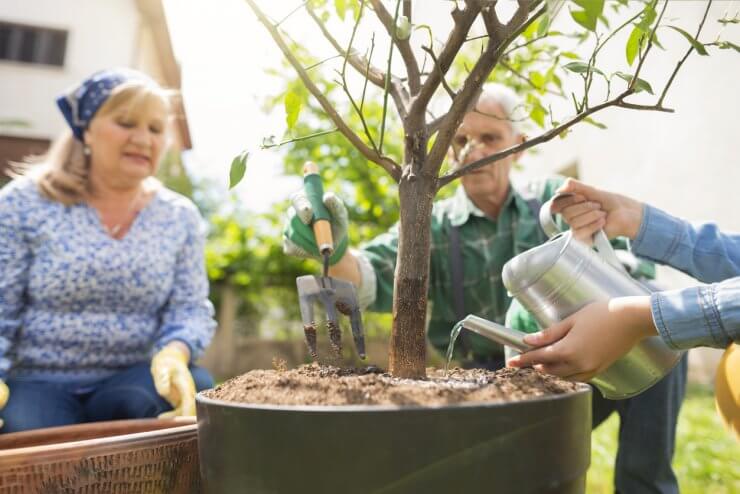
Watering a lemon tree
Keep your tree’s soil moist, but not soggy. In general, plan to water your tree with a quart to a half gallon of water every five to seven days. Make sure the container your tree is growing in has adequate drainage, so the roots are never standing in water. Check the soil’s moisture level periodically. You can use something as basic as a pencil to poke down into the soil to see where the moisture is.
In the winter time, when humidity is lower, you may need to provide a little extra moisture for the air. If you put the container on top of a layer of pebbles or marbles, you can add water to that layer. You’ll be providing extra moisture for the air and improving airflow for the plant. You can also mist the tree’s leaves with a spray bottle; that will provide humidity and get any accumulated dust off the leaves as well.
Soil
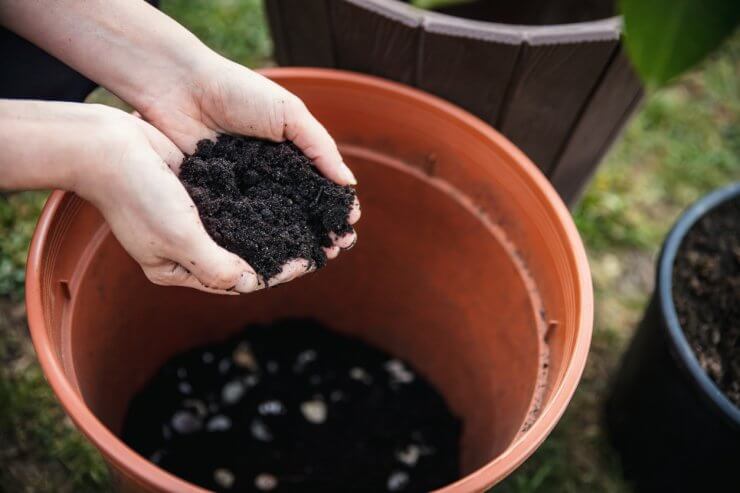
Soil for a lemon tree
For a happy, healthy lemon tree, use a commercial soil mix developed for trees. Some gardeners prefer to use soil from their garden, but that can introduce any number of pathogens to your young tree.
When it comes to using fertilizer, only fertilize your tree when it’s actively growing, usually spring through summer. Choose a slow-release granular fertilizer made especially for citrus plants. If there are no specific instructions for container-grown trees, mix the fertilizer at half the recommended strength.
Pruning
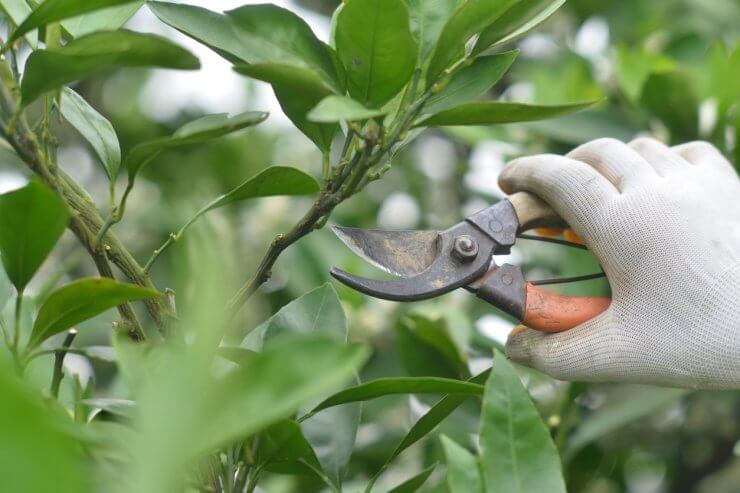
Pruning a citrus tree
Even dwarf variety lemon trees can grow to a sizeable height. To keep your container-grown tree at a manageable size, you’ll want to prune it regularly. Cut new shoots back to about half their length, cutting just above a leaf. Assess the inside branches of your tree. If it’s getting dense in the middle, prune some of those inner branches back; this will improve airflow and will let more sun get to the middle of your tree. Remove dead wood on a regular basis.
Have you grown lemon trees in containers? Do you put them outside for part of the year, or grow them indoors year-round? Please tell us about your successes and challenges growing lemon trees in containers.


 Previous
Previous


Hey there, I’m brand new to the potted citrus world but my daughters have been begging me to plant one this summer. So I’m starting to try and understand how to successfully do so. I’m in Wichita, KS (zone 7a). I’d like to do a Meyer lemon tree. A few questions…I have a 5 gallon pot. Is that ok? Also do I fertilize it this summer or do I wait until winter once I bring it inside. How often should I water it while it’s outdoors and then how often should I water it indoors? Thank you!
Fantastic Linda! – what tunes do lemons like to listen to?
I have a minature lemon tree. I live in Wisc. I bring it in in Sept in winter. I have a grow light for the dark days of winter.In Nov I had about 8 ripe lemons. I spray it almost everyday. I also play a radio for it???? It started getting blossoms again in Dec and Jan.
Cynthia, I love a success story. Thank you for sharing.
I have 3 Lime (and 1 Grapefruit) trees that I started from seed about 7 or 8 years ago. I live in northern Indiana, and we bring them in before the first frost and set them back out our sunny, south-facing deck as soon as we can in the Spring. They are all about 5.5 feet tall, and I got a few blossoms 2 years ago, and actually got 5 limes last year. I just found 2 blossoms yesterday, so I’m hoping that I can increase my harvest!
I appreciate the banana skin tea suggestion! Lazy me, I’ve never really looked up any “how to grow citrus in Indiana” information, so this article is timely! I hope to get a greenhouse going in the next year or so – hopefully, I can make them a better winter home!
Thank you!
What is banana skin tea?
Hi Pat,
I’m not sure what Jaye’s recipe is, but banana skin tea is a simple home-brew using discarded banana peels. Most people fill a mason jar with water, add peels and then let the mixture steep for a couple of weeks. Once the tea is ready, discard the peels and dilute 1 part tea with 5 parts water before applying to plants. There are lots of plants that appreciate a boost of potassium, especially tomatoes, peppers, cucumbers and apparently Jaye’s lemon tree. Good luck and let us know if you end up making a batch and using on your own plants.
My recipe is just boiled water to get the impurities out, add banana skins and let it steep for a week or more. Then strain it, add more water to double the quantity and use it.
I have a lemon tree I started from seed 🙂 It is about 4 feet high now – actually it is three trees braided together 🙂 I gave it a drink of banana skin tea this summer and WOW! It took off! Since bringing it inside for the winter, I have it in a south facing window. I know exactly when it needs water as the leaves look like they are about to wilt. I have it in a 12″ plant pot. The leaves smell devine when rubbed!
Jaye,
I love hearing success stories! Citrus trees need potassium, especially for fruit production and banana skin tea is a great way to provide extra nutrients.